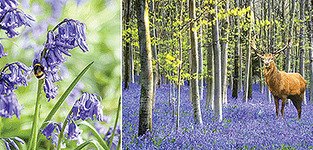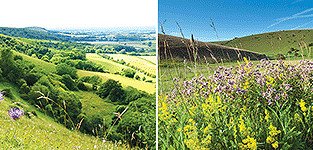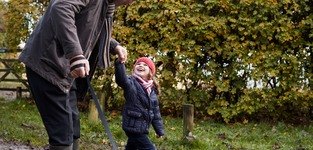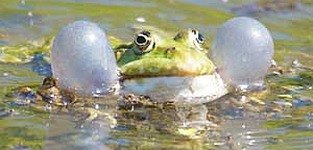Going for gold - the Silver-spotted skipper
August 1st, 2018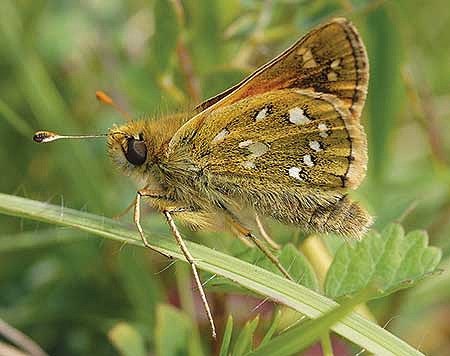 Am I the only one not interested at all in the World Cup? I can’t think of anything duller than watching a bunch of over-paid men kicking a bag of gas up and down a field.
Am I the only one not interested at all in the World Cup? I can’t think of anything duller than watching a bunch of over-paid men kicking a bag of gas up and down a field.Am I the only one not interested at all in the World Cup? I can’t think of anything duller than watching a bunch of over-paid men kicking a bag of gas up and down a field. By the time you read this we’ll have already worked out which country is the best at kicking a ball and we can forget about it all for another four years. Meanwhile, I’ll be spending my July and August in pursuit of my favourite sport - butterfly watching - and I’ll be sat on the turf watching a tiny orange butterfly racing around and fighting.
When it comes to sports, the Silver-spotted skipper is a true Olympian and stands on all levels of the podium. Their wings are golden and bronze with shining silver panels on the underside. It’s one of our smallest butterflies and it gymnastically zips, twists and flips around the downland turf at incredible speeds. The males are vicious little blighters too. They defend a territory and will attack any other insect that dares wander into their arena.
And the one thing they love more than racing and fighting is sunbathing. In Sussex you’ll only find them on the hottest slopes of the South Downs where they seek out their favourite hotspots – the bare ground created by grazing animals. This bare earth heats up and forms a microclimate much warmer than the surrounding grass - and to a tiny butterfly that’s the difference between Iceland and Ibiza.
These butterflies were doing fine for centuries but back when England last won the World Cup in 1966 the world above their hot hoof-print havens had begun to shift. Changes in economics and agricultural policies took the sheep off the Downs and the cold shadows of tall grasses, brambles and thorns took over. With their habitat cooling, the future looked dark for our sun-loving skipper and by the tense semi-finals of the 1990 World Cup it was facing extinction in Britain. In Sussex it held on at a few colonies on the far eastern edge of the South Downs. But the world has started to change again; we’re getting hotter! As the global temperatures rise, people and polar bears are panicking but this little butterfly has kept its cool. It is finding that there are now more of those nice hot microclimates available.
Meanwhile, conservation groups across the South Downs have brought back grazing to conserve our precious chalk downland habitat. Up on Malling Down near Lewes you’ll see my woolly colleagues, the hungry Herdwick sheep, at work on the Sussex Wildlife Trust’s reserve. It’s one of the hotspots for this skipper in Sussex. With the sheep creating the perfect habitat and the thermometers rocketing each summer the stage is set for a Silver-spotted comeback! And here he comes! Off to a flying start in the eastern South Downs! Passing Alfriston and Firle! Overtaking Lewes on the inside! Vaulting past Ditchling and Wolstonbury and, with a hop, skip and jump, he’s made it to Storrington! Re-conquering the South Downs - 42 miles in 28 years - surely that’s worthy of a medal!
Head out for a walk on the South Downs in August and you may be in with a sporting chance of spotting this skipper – as well as many other beautiful chalk downland butterflies.
www.sussexwildlifetrust.org.uk
By Michael Blencowe: Learning & Engagement Officer, Sussex Wildlife Trust.
silver-spotted skipper butterfly©Graeme Lyons Sussex Wildlife Trustt
Sussex Wildlife Trust is an independent registered charity caring for wildlife and habitats throughout Sussex. Founded in 1961, we have worked with local people for over half a century to make Sussex richer in wildlife.
We rely on the support of our members to help protect our rich natural heritage. Please consider supporting our work. As a member you will be invited to join Michael Blencowe on our regular wildlife walks and also enjoy free events, discounts on wildlife courses, Wildlife magazine and our guide book, Discovering Wildlife in Sussex. It’s easy to join online at www.sussexwildlifetrust.org.uk/join or T: 01273 497532.
When it comes to sports, the Silver-spotted skipper is a true Olympian and stands on all levels of the podium. Their wings are golden and bronze with shining silver panels on the underside. It’s one of our smallest butterflies and it gymnastically zips, twists and flips around the downland turf at incredible speeds. The males are vicious little blighters too. They defend a territory and will attack any other insect that dares wander into their arena.
And the one thing they love more than racing and fighting is sunbathing. In Sussex you’ll only find them on the hottest slopes of the South Downs where they seek out their favourite hotspots – the bare ground created by grazing animals. This bare earth heats up and forms a microclimate much warmer than the surrounding grass - and to a tiny butterfly that’s the difference between Iceland and Ibiza.
These butterflies were doing fine for centuries but back when England last won the World Cup in 1966 the world above their hot hoof-print havens had begun to shift. Changes in economics and agricultural policies took the sheep off the Downs and the cold shadows of tall grasses, brambles and thorns took over. With their habitat cooling, the future looked dark for our sun-loving skipper and by the tense semi-finals of the 1990 World Cup it was facing extinction in Britain. In Sussex it held on at a few colonies on the far eastern edge of the South Downs. But the world has started to change again; we’re getting hotter! As the global temperatures rise, people and polar bears are panicking but this little butterfly has kept its cool. It is finding that there are now more of those nice hot microclimates available.
Meanwhile, conservation groups across the South Downs have brought back grazing to conserve our precious chalk downland habitat. Up on Malling Down near Lewes you’ll see my woolly colleagues, the hungry Herdwick sheep, at work on the Sussex Wildlife Trust’s reserve. It’s one of the hotspots for this skipper in Sussex. With the sheep creating the perfect habitat and the thermometers rocketing each summer the stage is set for a Silver-spotted comeback! And here he comes! Off to a flying start in the eastern South Downs! Passing Alfriston and Firle! Overtaking Lewes on the inside! Vaulting past Ditchling and Wolstonbury and, with a hop, skip and jump, he’s made it to Storrington! Re-conquering the South Downs - 42 miles in 28 years - surely that’s worthy of a medal!
Head out for a walk on the South Downs in August and you may be in with a sporting chance of spotting this skipper – as well as many other beautiful chalk downland butterflies.
www.sussexwildlifetrust.org.uk
By Michael Blencowe: Learning & Engagement Officer, Sussex Wildlife Trust.
silver-spotted skipper butterfly©Graeme Lyons Sussex Wildlife Trustt
Sussex Wildlife Trust is an independent registered charity caring for wildlife and habitats throughout Sussex. Founded in 1961, we have worked with local people for over half a century to make Sussex richer in wildlife.
We rely on the support of our members to help protect our rich natural heritage. Please consider supporting our work. As a member you will be invited to join Michael Blencowe on our regular wildlife walks and also enjoy free events, discounts on wildlife courses, Wildlife magazine and our guide book, Discovering Wildlife in Sussex. It’s easy to join online at www.sussexwildlifetrust.org.uk/join or T: 01273 497532.
Comments (0)
No comments have been submitted yet.Why not be the first to send us your thoughts
Leave A Comment
Thank you for your comments, they will appear shortly once approved.
Recent Posts
Have You Seen...


